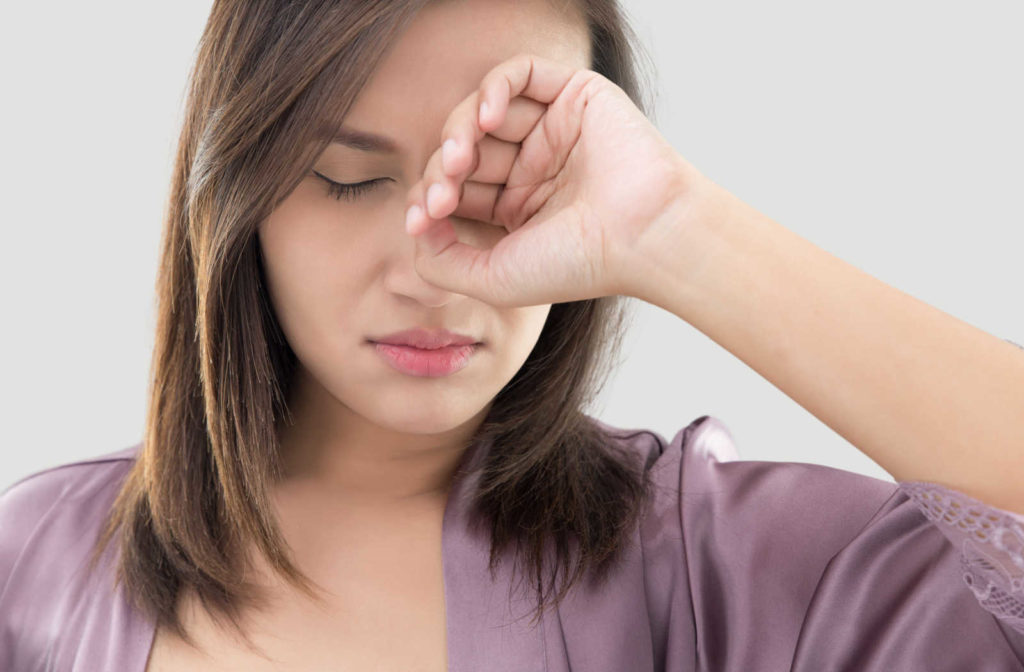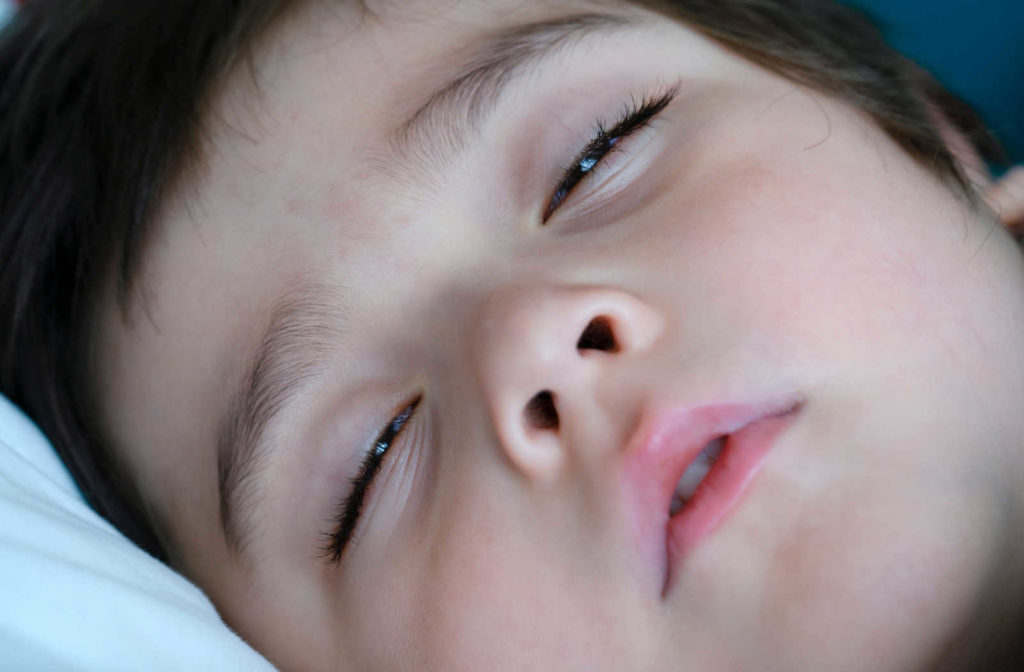For about 30% of Canadians, dry eyes are a common occurrence, causing discomfort and even pain in some cases. The condition occurs when the eyes do not produce enough tears or the tears produced are of poor quality. However, your optometrist can help diagnose the exact cause of this problem through a comprehensive eye exam and dry eye work-up.
Dry eyes at night can be particularly frustrating, waking you while sleeping and having difficulty opening your eyes upon waking. Treatments are available to combat dry eyes, but only if you know what’s causing it. Dry eyes at night could result from many factors, dry environments, contact lens use, screen time throughout the day, or your eyes not fully closing while you sleep.
Causes of Dry Eyes
One of the leading causes of dry eyes is a condition called meibomian gland dysfunction (MGD). About 85% of all cases of dry eye result from MGD. Meibomian glands are located in the eyelids and produce an oily layer that helps to keep the tears from evaporating too quickly. When these glands become blocked or malfunction, the oily layer is not produced, causing the tears to evaporate more quickly, leading to dry eyes.
Systemic conditions and autoimmune diseases such as Sjögren’s syndrome can also contribute to dry eye. Sjogren’s syndrome is an autoimmune disorder that, among other things, affects the body’s ability to produce tears and saliva.
Certain medications can also cause dry eyes. For example, antihistamines, oral contraceptives, and antidepressants are known to have dry eyes as a side effect. If you are taking any of these medications and are experiencing dry eyes, speak with one of our eye doctors. They can help manage the situation and if needed communicate with your family doctor or specialist to see if an alternative medication can be used.
Other factors that can increase your risk of developing dry eyes include:
- Aging
- Hormonal changes
- Dry and windy weather
- Excessive screen time
- Vitamin A deficiency
Dry Eye Symptoms
Different people can experience dry eyes in different ways. Common symptoms include:
- Intermittent blurred vision
- A gritty or scratchy feeling
- Burning eyes
- Redness
- Sensitivity to light
- Mucus discharge
- Excessive tearing (Your eyes flood in response to chronic dryness)
Dry eyes can even be harmful and result in scarring if left untreated. Your tear film protects your eyes and keeps the surface smooth. Without it, you could be at risk of corneal scarring, corneal abrasion or erosion.

How Night Affects Your Eyes
Dry eyes tend to be worse at the end of the day or during the night for several reasons. For one, every day our eyes face drying environmental factors like dust, dry air and wind which can leave them feeling strained and tired. Screen time, including computers and smart phones and periods of intense concentration can cause you to blink less. This reduced blinking can catch up with you at the end of a long day and leave your eyes dry and irritated.
Contact lens use for long periods during the day can also contribute to end of day dryness and discomfort.
Physical factors such as loose eyelids are another contributor to dry eyes. Some people consistently wake up with dry eyes due to a condition called nocturnal lagophthalmos.
Nocturnal Lagophthalmos
Lagophthalmos is a condition in which your eyes don’t close completely. If this only happens when you sleep, it’s referred to as nocturnal lagophthalmos, and you may not even know you have it.
People with this condition don’t fully close their eyes when they sleep, meaning their eyelids cannot form a seal to hold in moisture. This gap will leave your eyes open to the air and can result in dry spots that upon waking are uncomfortable.
There are a few different causes for lagophthalmos. The first group of reasons results from damage to the facial nerve, which controls the muscles in your eyelid. A variety of things can cause this, including:
- Blunt force injuries
- Bell’s palsy
- Strokes
- Tumours
- Möbius syndrome
- Certain autoimmune conditions
Lagophthalmos could also be caused by direct damage involving the eyelids, such as:
- Scarring
- Reactions to medication
- Diseases such as Stevens-Johnson syndrome
- Eyelid surgery
- Floppy eyelid syndrome
Managing Dry Eyes At Night
Fortunately, there are ways to manage the symptoms of dry eyes. One of the most effective ways is to use over-the-counter artificial tears or ointments. These can be used as needed to help lubricate the eyes and relieve dryness, itching, and burning. You can also use a humidifier in your bedroom at night, adding moisture to the air or sleep with a special dry eye protective mask to help reduce dry eye symptoms.
Other treatments for dry eyes include:
- Medicated eye drops
- omega-3 nutritional supplements
- Staying hydrated
You can also place a warm compress over your closed eyelids for a few minutes before going to bed. This warming can help unblock the meibomian glands and increase the production of the oily layer of your tear film, ensuring you’re producing good-quality tears.
At In Focus Eyecare, we have a fully equipped dry eye clinic to help diagnose, manage and treat your dry eyes. New treatments like Intense Pulsed Light (IPL), Radio Frequency (RF) massage and iLux gland expression can help give a boost in tear function and reduce symptoms
Relief From Dry Eyes
A good night’s sleep is essential to a healthy life. If you are experiencing dry eyes at night and it is affecting your ability to sleep, book an appointment with our friendly team of optometrists at In Focus Eyecare.





